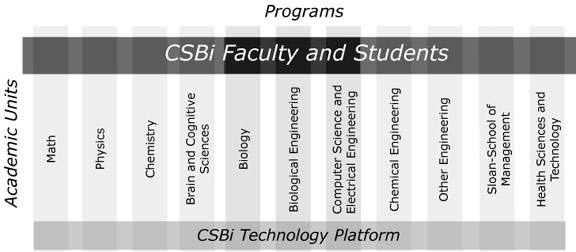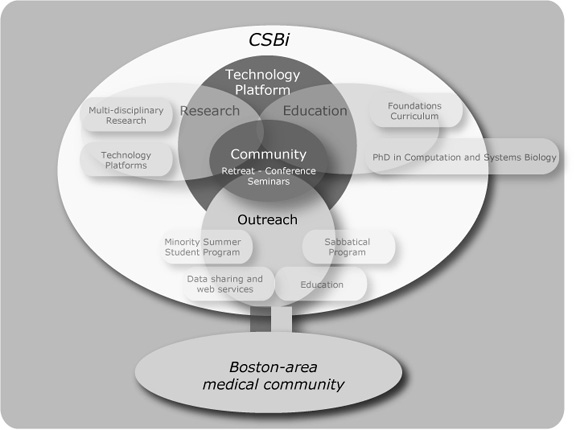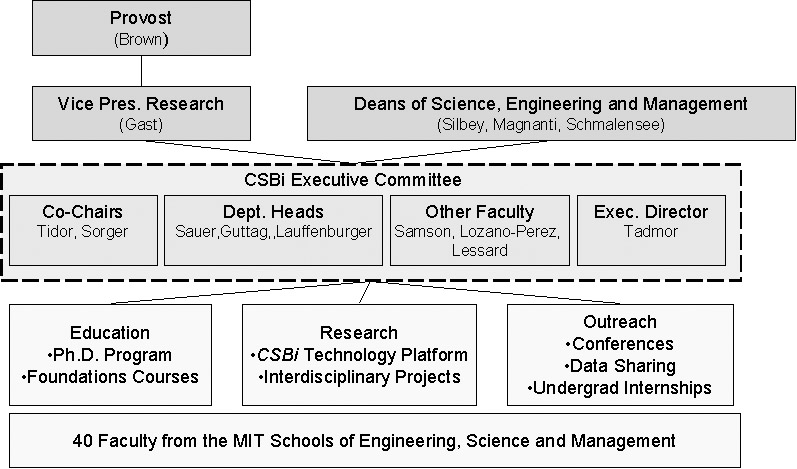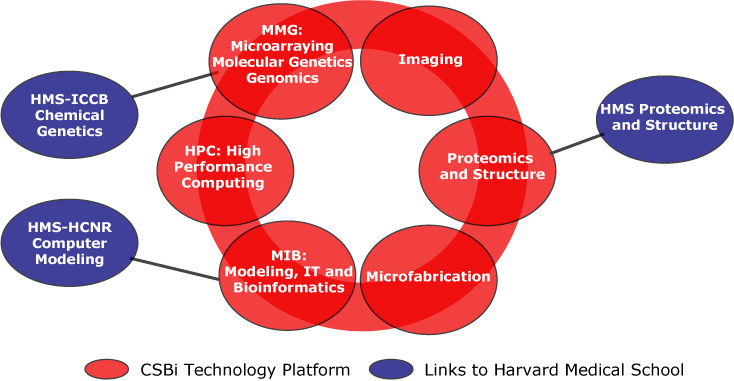Computational and Systems Biology Initiative
Goals and Priorities
The Computational and Systems Biology Initiative (CSBi) is a campus-wide research and education effort that links biology, computer science, and engineering in a multidisciplinary approach to the systematic analysis and modeling of complex biological phenomena. CSBi's mission is to advance research and education in the emerging field of systems biology and to pursue high-impact collaborations with industrial companies engaged in biomedical and pharmaceutical research. CSBi is currently active in four main areas:
- Multi-disciplinary research projects that integrate systematic experimentation and computational modeling
- Development of new technologies for measuring and modeling complex biological processes
- Creation of a new curriculum to educate the next generation of undergraduate and graduate students
- Outreach to a worldwide community of industrial and academic research scientist, engineers and educators interested in systems biology
CSBi was established as a virtual center that integrates activities related to systems biology at MIT into a single coherent research and education program. Currently, CSBi involves about 40 faculty and dozens of students from more than 10 academic units in the Schools of Engineering, Science, and Management. CSBi membership is open to anyone on campus with a self-identified interest in its research and education programs. Membership in CSBi, like membership in a department, represents a commitment to a shared program of teaching, research, and service.
CSBi was officially launched in January 2003, with an inaugural symposium showcasing ongoing systems biology research at MIT. The symposium featured keynote addresses by President Charles Vest, Provost Robert Brown, and Vice President for Research Alice Gast, all of whom reinforced MIT's commitment to systems biology as applied to basic science, engineering, and medicine.
MIT is uniquely positioned to play a leadership role in systems biology. The Institute has exceptional strengths in the key disciplines required to advance the field of molecular and cell biology, device and tissue engineering, and electrical engineering and computer science. Moreover, MIT has already formed an academic unit bridging the disciplines of biology and engineering (the Biological Engineering Division) and has an academic culture that fosters collaborative and interdisciplinary research without compromising expertise in the traditional disciplines. Finally, the Institute has a long history of bringing lasting benefit to society by working on high-impact research problems and their application.
The importance of systems biology to MIT's leadership in the biological sciences is reflected in public statements from key people across MIT.
 CSBi—a virtual program that spans multiple academic units and is based on a shared technology platform. |
The Intellectual Challenge
Biological systems are extremely complex. Great progress has been made over the past 50 years with research programs that have in large measure ignored this complexity, focusing instead on careful study of the properties of individual biological molecules in vivo and in vitro. Great success has attended this component-by-component analysis but its limitations are now becoming apparent. To elucidate how the tens of thousands of biomolecules in a typical cell function together to carry out critical biological processes will require the development of new analytical tools and experimental strategies that lie at the interface between biology, engineering, and computer science.
To be fully understood, biological processes need to be studied from a systems perspective that investigates interactions among collections of components while not losing sight of the mechanistic detail and chemical insight that have been the great strength of molecular biology for the past 50 years. We envision an integrative approach in which both hypothesis-driven and high-throughput experimentation is tightly linked to quantitative analysis and formal modeling. The resulting models are refined through iterative cycles of experimentation and computation until they are sufficiently robust to predict biological behavior.
Accurate predictive models of biological processes represent a much more efficient means to store and propagate knowledge than the current proliferation of databases. Over the next few decades we can therefore expect systems-wide models to have an important role in biological and biomedical research and to lay the conceptual foundation for the development of an effective and equitable individualized medicine.
Organization
The systematic experimentation at the core of much CSBi research involves large-scale multi-disciplinary projects. In organizing CSBi we want to enable these large-scale projects while retaining the flexibility and proven effectiveness of autonomous groups led by individual faculty. To that end, CSBi combines features of a platform organization, which emphasizes a common set of core technical capabilities, and a flexible community of independent labs, in which actual research is undertaken.
 CSBi activities in the areas of research, education and outreach are built on the foundation of the CSBi Technology Platform, knitted together by community events such as retreats, conferences, and symposia. |
CSBi is virtual in the sense that CSBi faculty and facilities do not reside in one building or department. Virtualization facilitates rapid integration of expertise, people and technology from across MIT, while allowing participating faculty to remain embedded in their traditional academic disciplines. CSBi faculty, staff and students are brought together to work on new systems biology research projects and educational programs assisted by the financial and organizational infrastructure of CSBi. Although virtual in nature, CSBi embodies a real Institute-wide commitment of resources to systems biology. Thus, CSBi is actively raising new research funds, developing joint educational and outreach programs, and building a shared technology capability (the CSBi Technology Platform).
Administration and Governance
CSBi is led by faculty cochairs and a senior staff member, under the guidance of an Executive Committee. The faculty committee comprises the Heads of Biology, Biological Engineering (BE), and Electrical Engineering and Computer Science (EECS), the CSBi cochairs, and three other senior faculty members drawn from the Schools of Science, Engineering, and Management. This committee has been meeting for three-hour sessions once a month over the past year. Its current membership is: Professors John Guttag, head, EECS; Doug Lauffenburger, director, BE; Don Lessard, associate dean, Sloan School of Management; Leona Samson, director, Center for Environmental Health Sciences; Robert Sauer, head, Biology Department; Peter Sorger, CSBi cochair and associate professor of biology and BE; Bruce Tidor, CSBi cochair and associate professor EECS and BE; Tomas Lozano-Perez, professor of EECS; and Dr. Brigitta Tadmor, CSBi executive director.
CSBi reports to the office of the provost through the associate provost and vice president for research, Alice Gast. Oversight for CSBi educational programs is provided by participating departments and the deans of the Schools of Science and Engineering, Robert Silbey and Tom Magnanti. Day-to-day operations are carried out by a administrative staff of three, currently housed in Building 68, assisted by administrative staff from existing departments, mostly Biology.
 Administration and management of CSBi: day-to-day operations are run by cochairs Tidor and Sorger and executive director Tadmor. |
Programs in Education, Research, and Outreach
Research
CSBi Research is organized around interdisciplinary projects, some of which are already active and some of which are currently being set up. Ongoing research projects include:
- Gene Networks–The goal of the Gene Networks project is to use data on gene expression, protein-DNA association and chromatin dynamics derived from microarrays and other high-throughput methods to construct genome-wide models of genetic regulation.
- Cell Decision Processes–The goal of the 12-investigator Cell Decision Processes project is to determine how cell fate is regulated by signal transduction processes that control apoptosis. Large-scale cell biological experiments, micro-fabricated devices for assaying protein states and computational models are being developed to study apoptosis in human cells from a systems perspective.
- Predictive Toxicology–The goal of predictive toxicology is to understand how signaling systems mediate the cellular response to environmental and chemical stress. The Predictive Toxicology program also aims to extend the cellular view of molecular mechanism to an understanding of stress response in humans and to variation among individuals in a population. Applications of predictive toxicology include the analysis of toxins and their impact on human and environmental health, and the development of new pharmaceuticals with greater selectivity and reduced toxicity.
- Cancer Models–The goal of Cancer Models is to understand mechanisms of tumorigenesis within respect to the activities of networks of genes and proteins rather than single causative agents.
- Tissues-on-a-Chip–The goal of Tissues-on-a-Chip is to apply tissue engineering to the fabrication and study of tissue-like structures ex vivo. It is clear that the response of cells to hormone, growth factor and cytokine signals is modulated by their three-dimensional environment. The Tissues-on-a-Chip project is particularly interested in applying numerical modeling and systematic analysis to cell-cell signaling involved in the formation of human liver.
- Synthetic Biology–The goal of the Synthetic Biology project is to develop the design and fabrication tools needed to build and operate devices containing biological components. These devices include intra-cellular sensors of cell physiology and biology-based logic circuits. Currently, the construction of a "standard parts list" for the generation of biological circuits is being assembled.
In addition, CSBi faculty from MIT's Sloan School of Management are interested in assessing the impact of systems biology on innovation in the pharmaceutical and related industries, and on organizational aspects of this multidisciplinary research and education effort.
CSBi Technology Platform
To make complex large-scale experiments possible, CSBi is investing time and money in the creation of an integrated technology platform that encompasses key areas of expertise required for systems biology research. In keeping with CSBi's virtual organization, this platform is distributed across campus and based in large part around existing core facilities. Additional resources are being put into these cores and a new cadre of senior CSBi research scientists recruited to knit disparate facilities into core competencies. In keeping with MIT's tradition of invention and innovation, the CSBi Technology Platform is also expected to play an important role in the development of new methods and technologies in six key areas:
- Imaging–Hardware, software and methods for the acquisition and computational analysis of optical, EM and CT images
- Proteomics and Structure–Mass spectroscopy, 2D gel technologies, biophysical chemistry, X-ray crystallography, and NMR for the high-throughput analysis of proteins and their structures
- Microsystems–Fabrication and testing of microelectromechanical systems (MEMS) that incorporate microfluidic, optical, microelectronic, and biological components
- High-Performance Computing (HPC)–Cluster systems and large-scale parallel computing for biology-directed ciomputation and modeling
- Modeling, Information Technology and Bioinformatics (MIB)–Hardware, software, and programming expertise for processing biological data and building numerical models at different levels of abstraction
- Microarraying, Molecular Genetics and Genomics (MGG)–Robotic instrumentation, clone sets and facilities for DNA and protein microarraying, RNAi-based gene inhibition, and high-throughput DNA manipulation
 The CSBi Technology Platform comprises six core technologies at MIT and several affiliated facilities (at Harvard Medical School). Each component of the platform is managed by a CSBi research scientist whose mission is to link geographically dispersed facilities into one coherent core competency. |
Education
CSBi is working with Biology, BE, and EECS to develop a new curriculum in systems biology for graduate and undergraduate students. In 2003–2004 CSBi will propose to the Institute that a new PhD program be established in the area of Computational and Systems Biology. This program will be administered through two existing academic units in the Schools of Science and Engineering (Biology and Biological Engineering) and will feature a new set of courses on the "Foundations of Systems Biology" that have recently been developed.
A special feature of MIT undergraduate education is hands-on experience with the latest laboratory techniques. The CSBi research scientists will play an active role in helping lab and lecture-based course instructors gain access to the CSBi Technology Platform. They will also teach short technology-oriented courses and provide materials to course instructors. New courses in the "Foundations" curriculum include:
- Foundations of Bioinformatics and Computational Biology: Professors Yaffe, Keating, and Burge. This course was launched in the spring of 2002 and has about fifty graduate and advanced undergraduate students. The subject provides broad coverage of the field with equal emphasis on sequence, structure, and systems analysis. The focus is on fundamental concepts rather than on the application of specific tools, the goal being to encourage and train students in the development of new methods. The subject will fulfill the CSB PhD program's computational biology core requirement and serve as an elective in existing departmental PhD programs.
- Foundations of Measurement in Biology: Professors Manalis and Sorger. This course, derived from an existing Silicon Biology course, is being taught for the first time with its new syllabus in spring 2004. Optics, structure, and microfabricated systems are discussed, as is sampling theory and data transformation. The goal is to train students in the fundamental physics and information theory behind experimental measurement with an eye to overcoming current limitations. This subject will serve as an advanced elective for the CSB program and as an elective in existing departmental PhD programs.
- Algorithms for Computational Biology: Professors Tidor and Lozano-Perez. This course is currently under development for launch in the spring of 2004. The course is planned as a case-based study illustrating the power of tailoring questions in computational biology to the capabilities of contemporary algorithms and computer hardware. This subject will serve as an advanced elective for the CSB PhD program and as an elective in existing departmental PhD programs.
- Topics in Computational and Systems Biology: This new course will be literature-based and required for all first-year students in new CSB PhD program. The goal is to use detailed discussions of selected research papers in the area of computational and systems biology to help students design new research projects.
Outreach and Community Building
CSBi outreach activities include the creation of publicly available open-source software to analyze data, the use of OpenCourseWare to share educational materials, an annual scientific symposium for the academic and industrial scientific community worldwide, a visiting program for minority and economically disadvantaged undergraduates and visiting faculty, and close collaborations with industry.
Outreach to Students
Starting in the summer of 2004, CSBi will offer a 10-week summer internship at MIT for minority and economically disadvantaged undergraduate students at the end of their junior year of study. The junior year is a particularly critical time for students who are considering medical and graduate school. Students will conduct supervised research in the labs of CSBi faculty and the CSBi Technology Platform. The program will be research-focused and modeled on the successful Undergraduate Research Opportunities Program (UROP).
Outreach to Faculty
Starting in the spring of 2004, two sabbatical positions will be established for faculty from undergraduate teaching institutions enrolling significant numbers of economically disadvantaged students. The sabbaticals will typically last six months. The goals of this program are to introduce faculty from community colleges and academic institutions with economically disadvantaged and minority students to the emerging field of systems biology; to facilitate the introduction of new course materials in this field into the home institutions of visiting faculty; and to develop research collaborations between visiting professors and MIT investigators that will lead to independent research programs at their home institutions.
Data Sharing
With the emergence of systems biology and the generation of large and complex data sets, it has become increasingly important to develop mechanisms for sharing primary research data. Hitherto, primary data in biology have remained largely in handwritten form in notebooks at the lab that collected them and only summaries are published. One of the great promises of systems biology is the development of models that encompass large numbers of experimental observations. Recognizing this promise, CSBi will support the staff and infrastructure required for the distribution of systematic biological data.
CSBi Symposium
In January 2003, CSBi held its inaugural symposium on computational and systems biology, entitled "From Bioinformatics to Biofabrication". The 2003 event was focused on systems biology research at MIT and covered areas such as "Systematic Experiments and Numerical Models", "Manipulating and Measuring Biological Systems", "Gene and Protein Networks", "Linking Function, Structure and Chemistry". The conference also included two industry perspective talks: "Drug Discovery and the New Biology", and "An Industry Perspective on Systems Biology". The conference was attended by more than 400 people from academia and industry, including people from the scientific press. President Charles Vest delivered the luncheon keynote address which was followed by a panel discussion with the CSBi Executive Committee members.
CSBi Workshop:
In April 2003, CSBi held its first retreat in Maine. This workshop was intended to bring together MIT students and faculty who wished to meet and learn from one another about systems biology. The emphasis was on computation and microsystems and their impact on biology. About 100 faculty and students from more than 10 academic units in the Schools of Engineering and Science attended (including the Whitehead Institute for Biomedical Research and the Harvard-MIT Division of Health Sciences and Technology).
Finances and Funding
CSBi has a five year funding goal of $80 million of which approximately $32 million has been raised thus far. Funding to date includes a generous gift from an anonymous donor ($6 million) for the CSBi Technology Platform and for education, a gift from Merck ($2 million) for graduate and postgraduate fellowships, and a National Institutes of Health grant ($18 million) for research in the area of cell decision processes.
In July 2003, CSBi issued its first request for proposals (RFP) for graduate and postdoctoral fellowships and for travel awards to attend meetings and symposia. All CSBi-affiliated labs are eligible for these awards with initial funding starting in the autumn, 2003. CSBi expects to issue an RFP for research projects in 2004, once industrial funding for a systems biology consortium has been finalized.
More information about the Computational and Systems Biology Initiative can be found at http://csbi.mit.edu/.